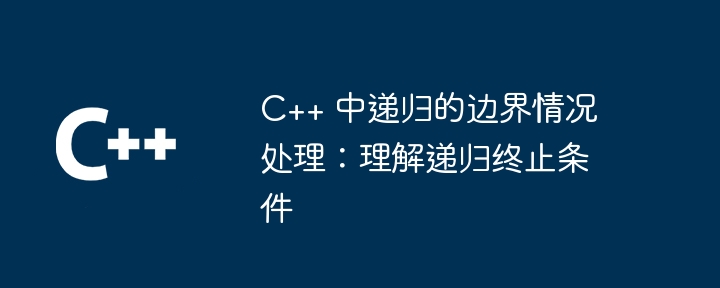
Handling edge cases in recursion is crucial. The following are the steps: Determine the basic situation: the conditions under which the recursion terminates and the result is returned. Return in base case: When the base case is met, the function returns the result immediately. Calling itself in recursive situations: When the base case is not satisfied, the function calls itself and keeps approaching the base case.

Boundary Case Handling of Recursion in C: Understanding Recursion Termination Conditions
Recursion is a programming technique that enables functions to Call itself. If edge cases are not handled appropriately, recursion can lead to stack overflow, where the program attempts to allocate more memory than is available. Edge cases are situations where a recursive function terminates and returns a result instead of continuing to call itself.
Understanding edge cases is crucial to writing effective recursive functions. Here are the general steps for handling edge cases:
Practical case: Calculating factorial
The factorial is the cumulative product of positive integers until 1. For example, the factorial of 5 (noted 5!) is 120, calculated as: 5! = 5 × 4 × 3 × 2 × 1 = 120.
We can use a recursive function to calculate the factorial:
int factorial(int n) {
// 基本情况:当 n 为 0 或 1 时返回 1
if (n == 0 || n == 1) {
return 1;
}
// 递归情况:调用自身并传入减小的参数
else {
return n * factorial(n - 1);
}
}In this example, the base case is that when n is 0 or 1, the function returns 1. For all other values, the function calls itself with decreasing arguments, continually approaching the base case, eventually causing the recursion to terminate.
The above is the detailed content of Handling edge cases of recursion in C++: Understanding recursion termination conditions. For more information, please follow other related articles on the PHP Chinese website!
 What are the differences between c++ and c language
What are the differences between c++ and c language
 Recommended learning order for c++ and python
Recommended learning order for c++ and python
 Cost-effectiveness analysis of learning python and c++
Cost-effectiveness analysis of learning python and c++
 Is c language the same as c++?
Is c language the same as c++?
 Which is better to learn first, c language or c++?
Which is better to learn first, c language or c++?
 The difference and connection between c language and c++
The difference and connection between c language and c++
 C++ software Chinese change tutorial
C++ software Chinese change tutorial
 Cost-effectiveness analysis of learning python, java and c++
Cost-effectiveness analysis of learning python, java and c++




